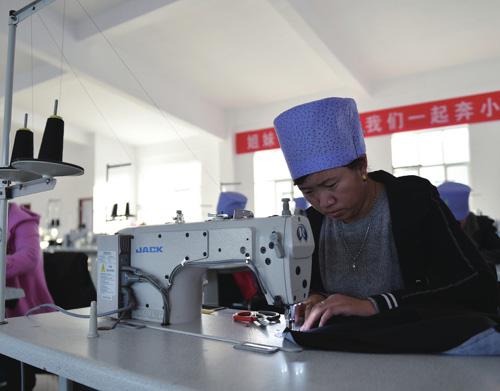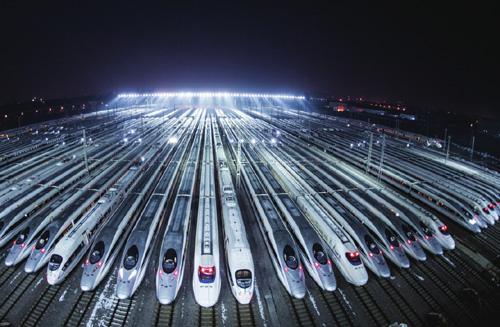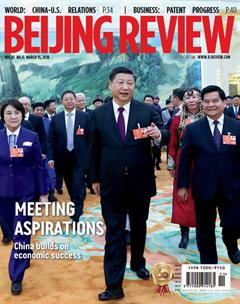A PLAN FOR THE NEW ERA
By Lan Xinzhen


Against the backdrop of uncertainty and instability around the world, what direction will Chinas social and economic development take this year? What positive infl uence will it have on the global economy? At this years Two Sessions such questions of concern to the international community are being addressed by Chinas leadership. The Two Sessions is a colloquial term for the annual sessions of the National Peoples Congress(NPC), Chinas top legislative body, and the National Committee of the Chinese Peoples Political Consultative Conference (CPPCC), the countrys top political advisory body.
In the Report on the Work of the Government delivered at the First Session of the 13th NPC on March 5, Premier Li Keqiang reviewed Chinas achievements over the past fi ve years and laid out the requirements and direction of policy for social and economic development in 2018.
According to legislators and political advisors at the Two Sessions, the report provides an important opportunity for those at home and abroad to understand Chinas development strategies.
“The report has made a series of important arrangements for high-quality development and the deepening of reforms,”said Zhang Zhanbin, a member of the CPPCC National Committee and Director of the Economic Research Department under the Chinese Academy of Governance. “It represents President Xi Jinpings thought on socialist economy with Chinese characteristics for a new era.”
Ouyang Hua, an NPC deputy and Secretary of the Baita Village General Branch of the Communist Party of China (CPC) in Yixing, east Chinas Jiangsu Province, spoke highly of the rural revitalization strategy mentioned in the report. He said he was impressed by the emphasis on building powerful new growth drivers for rural development through reform and innovation and improving the institutions and mechanisms needed to achieve integrated urban-rural development.
The report also highlights the current social and economic challenges faced by China. “The report specifies our tasks in many areas, reflecting the current governments clear understanding of domestic and international affairs,” said Qiu Xiaoqi, a CPPCC National Committee member and Chinas Ambassador to Mexico.
Huang Shouhong, Deputy Director of the State Council Research Offi ce and head of the team responsible for drafting the report, said his colleagues had collected ideas and suggestions from millions of people representing a variety of professions, social backgrounds and age groups through numerous channels including the Internet and symposiums, fully accommodating the wishes of the people.
“The report addresses peoples aspirations for a better life as well as their expectations for democracy, the rule of law, justice, fairness, safety and the environment,” said Yang Yanyi, a CPPCC National Committee member and former head of the Chinese Mission to the European Union.
Stable progress
The report sets the projected target for GDP growth at 6.5 percent for 2018, explaining that this target takes into consideration the need to secure a decisive victory in building a moderately prosperous society in all respects.
Qiu said the target is appropriate, suggesting that the government is not pursuing a high rate of growth. It is also in line with the general principle of pursuing progress while ensuring stability for the Chinese economy, which has ensured healthy economic expansion in recent years.
There have always been controversies surrounding Chinas growth targets, with some foreign media outlets expressing concern about the countrys economic prospects after Indias growth rate surpassed Chinas in 2017. Such concerns are unfounded considering that a 6.5-percent growth rate based on last years GDP of over 82 trillion yuan ($12.96 trillion) would be sufficient to fulfill Chinas social development goals such as wage increases for urban and rural residents, a high employment rate and an improved environment.
However, the diffi culties and challenges faced by the Chinese economy are many. World economic recovery is sluggish, global fi nancial markets are plagued by uncertainty and protectionism is mounting. Domestically, deep-rooted structural problems in the economy are becoming prominent and downward pressure has been increasing. In response to these issues, the Chinese Government has endeavored to stabilize growth by accelerating economic restructuring rather than resorting to strong stimulus measures.
This year the government will continue following the general principle of pursuing progress while ensuring stability, with the two regarded as indivisible. Such a policy will allow China to positively contribute to world economic growth, while bolstering the international communitys confi dence in the Chinese economy.
High-quality growth
Chinas GDP growth rate for 2017 was 6.9 percent, better than the pre-set target of 6.5 percent, leading some to question the ambition of this years target.
According to Qiu, the prudent target reflects the governments resolve to put quality before quantity in economic growth and improve the long-term competitiveness and performance of the economy.
The Chinese economy is transitioning from a phase of rapid growth to a stage of high-quality development, according to Huang.
High-quality development is essential to Xi Jinping Thought on Socialist Economy with Chinese Characteristics for a New Era.
In the face of fl uctuation in the international fi nancial market, sluggish global trade and the downward pressure on the Chinese economy, the Chinese Government has avoided stimulus measures such as quantitative easing and expansionary fiscal policies adopted by some developed countries and emerging economies, instead seeking to transform the growth model by reform and innovation to strengthen momentum in the long run.
The prioritization of quality growth reflects the Chinese Governments strong sense of responsibility. Although the international community has expressed doubts over the Chinese economy whenever fl uctuations in the stock market and foreign exchange rate have occurred, economic indicators are looking up as a result of the Chinese Governments policies.
“Had China chosen the traditional path of stimulation, robust economic growth in the short term might have been possible but serious negative outcomes would have followed, making todays achievements impossible,” said Huang.
Premier Lis report underlines Chinas intention to focus on high-quality growth, while addressing unbalanced and inadequate development. Committed to developing a modernized economy, the country will give priority to performance, promoting structural improvement and economic upgrading.
People first
The concept that development should be for the people, depend on the people and that the results should be shared by the people, is central to the governance of the CPC.
According to Huang, the Report on the Work of the Government refl ects a vision of people-centered development, establishing a series of measures closely related to peoples lives with a view to improving their overall livelihood, such as cutting the cost of starting businesses through alleviating tax burdens, raising the personal income tax threshold so as to boost incomes, promoting the rebuilding of dilapidated urban and rural housing, and increasing fi scal subsidies to basic healthcare. New requirements have also been put forward to increase incomes, improve healthcare and education, and simplify various procedures to make peoples daily lives easier and more convenient. The report responds to every issue of major concern to the public with tangible measures.

